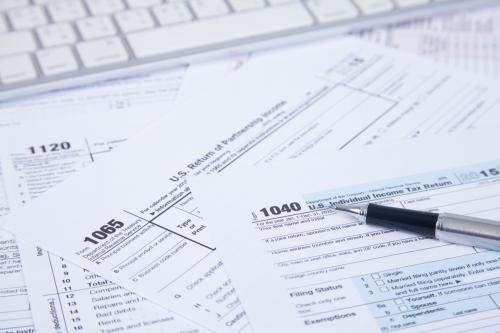The incidence and distributional effects of changes to the corporate income tax—like those in the 2017 Tax Cuts and Jobs Act—are one of the most hotly contested issues in economic policy. The debate often follows a familiar script: Republicans claim that rank-and-file workers benefit while Democrats argue that affluent shareholders reap the gains.
In a new paper, forthcoming at the National Tax Journal, we find that some workers do benefit from corporate tax cuts. But in the United States, where corporate profits tend to be shared disproportionately with high-income workers and managers, it is the most affluent employees who receive the largest benefits, not rank-and-file workers.
Why is understanding the burden of the corporate tax so complicated? Well, individuals ultimately bear the burden of all taxes, including taxes on businesses. The corporate income tax is borne by a combination of workers, capital owners, and shareholders. Leading simulation models used by policymakers generally assume that it is quite progressive and that shareholders bear about 60% of the burden. In this paper, we investigate a key assumption behind this result, using a large-scale microsimulation model to incorporate new evidence on how firms share their excess returns with workers (a process referred to as “rent sharing”). We find that the progressivity of the corporate income tax is quite sensitive to changes in assumptions about who bears the burden of taxes on corporations’ excess returns.
Let’s back up a step. What are excess returns, and why do they matter? The return to corporate capital consists of normal returns (the minimum return necessary for a firm to invest) and excess returns (also called rents or supernormal returns), returns above that level. Excess returns can derive from patents, monopoly power, special expertise or skills, returns to scale, and a variety of other factors. Standard assumptions imply that the burden of taxes on the normal return is split equally between all workers and all capital owners and that taxes on excess returns are borne by shareholders.
Recent literature, however, provides quasi-experimental evidence that firms in the U.S. and Europe share a substantial portion of their excess returns with workers, especially with high-income workers, managers, and executives. The implication of this evidence for analysis of tax policy is clear: To the extent that firms share rents with workers, some of the burden of taxes on corporate excess returns will be borne by labor, in contrast to the standard assumption that shareholders bear all taxes on rents. This raises questions about the progressivity of the corporate tax. No previous large-scale simulation analysis of the corporate tax has incorporated evidence about how firms’ rents are shared across different types of workers.
In this paper, we first review evidence that excess returns constitute a sizable portion of the corporate tax base and that firms tend to share rents with workers. In short, we find that rent sharing is an important empirical phenomenon that analysis of corporate taxation should address. We then incorporate evidence on rent sharing into the Urban-Brookings Tax Policy Center microsimulation model of the distributional effects of the corporate income tax. The model shows the impact of different policy specifications on households across the income distribution.
Using the TPC model, we find that the progressivity of the corporate tax is highly sensitive to different assumptions about which workers receive rents. If rents are shared broadly across workers, the corporate tax is less progressive than commonly thought. In the U.S., however, where the best available evidence suggests that rents are shared predominantly with high-income workers, managers, and executives, the tax remains at least as progressive as under standard assumptions. More generally, under different economic institutions or public policies, rent sharing can have meaningfully different effects on corporate taxes. This result may help explain a number of key puzzles in tax policy.
-
Acknowledgements and disclosures
The authors thank Caroline Webber, Stacy Dickert-Conlin, five anonymous referees, Jane Gravelle, and Richard Sansing for especially detailed comments; Rosanne Altshuler, Alan Auerbach, Len Burman, Dorian Carloni, Kim Clausing, Bill Gentry, Jennifer Gravelle, Ed Harris, Glenn Hubbard, Anton Korinek, Eric Ohrn, Sanjay Patnaik, Laura Power, Molly Saunders-Scott, David Splinter, Anna Stansbury, Kevin Strickland, Juan Carlos Suárez Serrato, Mallika Thomas, Eric Toder, Owen Zidar, Eric Zwick, and seminar participants at Brookings, Grinnell College, the American Economic Association meetings, Southern Economic Association meetings, Tax Economists Forum, University of North Carolina, and the Urban Institute for helpful comments and discussions; Lillian Hunter and Gordon Mermin for model runs; John Anderson and Atrayee Ghosh-Ray for software; Nora Cahill and Swati Joshi for outstanding research assistance; and Arnold Ventures and California Community Foundation (Gale) and the Peterson Foundation (Thorpe) for financial support. The views expressed are those of the authors and should not be attributed to any other individual or organization.
The Brookings Institution is financed through the support of a diverse array of foundations, corporations, governments, individuals, as well as an endowment. A list of donors can be found in our annual reports, published online. The findings, interpretations, and conclusions in this report are solely those of its author(s) and are not influenced by any donation.
The Brookings Institution is committed to quality, independence, and impact.
We are supported by a diverse array of funders. In line with our values and policies, each Brookings publication represents the sole views of its author(s).







